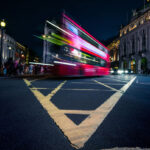Many photographers think that the only way to effectively blur the background of their photos is to use a wide aperture. Well, that is an effective method, but it’s only one of many. In this video, photographers Tony and Chelsea Northrup show us a number of ways to achieve background blur:
Move Your Subject Away from the Background

Place your subject farther from the background.
How many times have you been guilty of placing your subject right against a wall and then wondered why the background wasn’t blurry enough (even though you used a wide aperture)?
Simple, there was not much distance between the subject and the background. If the point of focus and the immediate background are very close to one another, you won’t be able to achieve shallow depth of field.
Solution? Separate your subject from the background and take the shot.
Get Closer to Your Subject

Filling the frame has the same effect as blurring the background
Simply ask your subject to move closer to you and the background will appear blurry. Tony Northrup has a simple piece of advice:
“The headshot always blurs the background more than a full body shot.”
Use a Wide Aperture

Use a small f-number
Here’s what you’ve been waiting to hear. Use the widest aperture possible with your lens. Just put the camera on Auto ISO and use the smallest f-number. A smaller f-number means less background sharpness.
Most kit lenses have an f-number around f/3.5–5.6. That is unsuitable for blurring the background. A prime lens like the 50mm f/1.8 that Tony Northrup refers to in the video works well for background blur.
Another thing that helps is a bigger sensor. Full-frame cameras tend to blur out the background more than smaller crop sensors.
Step Back and Zoom In

Step back and zoom in using a telephoto lens. The shot on the right uses this technique
This tip requires that you use a zoom lens. Step back and then zoom in tight. You’ll find more of the background blurred.
Use one or all of these simple tips to add beautiful background blur to your images.
Like This Article?
Don't Miss The Next One!
Join over 100,000 photographers of all experience levels who receive our free photography tips and articles to stay current:






Leave a Reply